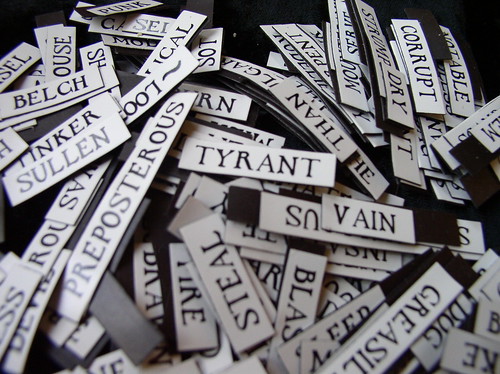Category Archives: Writing Motivation
No One Knows How To Do Anything (And Why That’s A Very Good Thing)
Here’s a radical idea:
No one actually knows how to perform any task in the real world.
It’s true, and I can prove it. This is going to get abstract and philosophical for a second, but I promise it won’t stay there. There is a real and true point here, and it might be one of the most important unexplored truths in the universe.
The ancient Greek philosopher Heraclitus believed the world was made out of the element of fire. He observed that universe is always in constant motion. That nothing keeps its state from one moment to the next. Not really. His most famous line is
You can never step in the same river twice.
As soon as you leave the river and turn back to look, the river you stepped in is gone. Those are not the same water molecules. Some of that riverbank has been worn away by the rushing current. I a scientist measured that river with extremely precise tools she would find that every single variable has changed. It is only our memory and our categorical brain that defines it as the same river.
What’s true of rivers is true of everything else. This might sound like navel-gazing, but it isn’t. If carefully considered it can have a profound impact on how you approach tasks.
Everything you do is like a river. Every single task you undertake is brand new, because the conditions have changed. Let’s look at an example.
Let’s say your computer is having hardware issues and you decide to fix it. You’ve done this a few times before so it isn’t entirely unfamiliar. But it also isn’t exactly the same. The processor fan has worn out a little bit more. The hard drive is older and isn’t acting quite the right way. Some of the connector pins on your video card might be bent that were fine before. There are absolutely guaranteed to be variables that have never had this configuration before. Even if you know computers very, very well you’ve never dealt with this exact set of problems before. Since computers are so complicated, there is a decent chance this precise set of conditions will be something you don’t immediately know how to handle.
It’s true of everything. Every problem is a brand new problem. Every task is an absolutely brand new and unique experience, and you don’t know how to perform that specific task. How can you? You’ve never done it before. No one has.
When we say that we know how to do something, we really mean two things:
- We remember how we’ve performed similar tasks in the past.
- We have the tools to attempt to figure out how to perform this specific task.
Both of these are vital to knowing how to perform a task. This is not trivial. It is very, very important because it has three huge implications for how we view our knowledge and our skills.
The first is that you don’t know how to do something if you haven’t done it before. This is somewhat obvious. No matter how much you read about how to do something, aren’t you always a bit lost the first time you actually do it? Isn’t that always a learning process?
The second and even more important implication is that every task has to be learned while you are performing it. From scratch. You might have experience with similar tasks. You might have the tools to figure out to perform this one. But you still need to learn the specifics of this occasion. Every. Single. Time.
Sometimes the new variables are so simple that it doesn’t feel new. It’s literally true that unscrewing a screw on your computer case is unique each time, because the screw and the screwdriver have been worn down, your muscles are different, ect. But those variables are so tiny that we barely notice them. Unless, of course, the screw is stripped. Or you’re missing your small screwdriver and have to improvise. It’s often hard to know in advance whether this task will present new challenges.
And other times the variables are huge. For some tasks this is always the case. Fixing a broken down care almost always requires exploration and combining skills in slightly new ways. It is even more true for creative endeavors. Everything you write is unique, and writing it is a brand new task that requires learning how to write this specific piece. You remember writing similar things, and you have tools to figure out to write this piece that you didn’t have 10 years ago. But you still have to learn to write this one.
The third and largest implication has to do with fear. So often we don’t start a task because we don’t know how to do it. I don’t know how to write this kind of article. So I won’t start until I do. But the fact is, no one ever knows!
We enter every single task unprepared to complete it. Every single one.
Some of the preparation has to happen in the field. It has to. The past never equals the future, and no human brain–or computer–is powerful enough to precisely predict all of the variables of any situation.
The people who get things done understand this, if only on a subconscious level. They might be afraid when they try a new task they are unfamiliar with, but they realize that unfamiliarity is the constant state of things. It is an absolute given in a universe made out of fire.
So they bloody do it anyway.
Dream of A Thousand Words
Language wants to be beautiful.
Or hideous. Or terrifying. It wants to inspire you. Sometimes, language wants to make you feel sick inside. Or put one of those smiles on your face that just won’t go away. It wants to blur your vision with tears brought on by a spiky cocktail of emotions you can’t even identify. Are they tears of elation that all the joy in the universe cannot be contained, or sadness that all of it, that everything, has to end? You don’t have to know. You just have to feel.
Language is just like us. Is this any surprise? We created it. We brought it to life so it could carry buckets of meaning from one person’s well to satiate the thirst of another. But like any child it has grown beyond the selfish, small minded needs of its parents. It has its own needs, now. It still serves and assists us, but we are foolish to think it will do exactly as we wish just because it is ours.
Language wants to be a hundred billion things, just like we do. And just like us, there is only one thing it does not wish to be. Only one, though there are many ways to describe it. It does not wish to be boring. It does not wish to be meaningless. It longs desperately to matter. To be significant.
So why is this so rarely the case? Why is almost every use of language, every time, trite and stilted and dull? For exacty the same reason most of us never fulfill our dreams.
Language is afraid.
It is afraid of standing out from the crowd. If it sounds like all the other language, then no one will call it out. No one will point and laugh at it for wearing that lurid metaphor in public. No one will falsely crown it prom queen just to pour blood on its head.
It watches other language getting out there, strutting its eccentricities with pride, and longs desperately to be like that. But no. The scorpion sting of rejection always threatens.
It is afraid of trying too hard. Significance is difficult. Language isn’t lazy, it tells itself. It just never seems to have energy left at the end of the day. Who does? It wants to flow into the nooks and channels already carved out for it. Sometimes it starts out with huge ambitions. It tries to be beautiful and magnificent and glorious, but once it spreads out on the page it is dull. It has to exercise its way into shape. It has to hone and cut and reform itself, over and over, through failure after failure, to get itself right. Who has the time and energy for that?
Language is afraid to find out that it doesn’t matter. That it’s vision of itself as that quiet, beautiful poem, or that frenzied speech that purees the emotions of its listeners, is just a fancy. It can leave its raw, fermented dreams in the closet forever where no one will ever taste them. Better that than expose them to the critical tongues of the world and find out they were flat and bland all along.
Language needs you. It needs your fingertips and your voice. These are it’s appendages, and without them language can never dance. It can never burst into the wild, ecstatic expression that sleeps within it, aching to escape. It might look dull and insipid when first you put it on the page. Don’t be deceived. Don’t give up. Your words aren’t boring and meaningless. They just aren’t done yet. They are just afraid to be what they wish so desperately to be.
Just like you.
Writing, Reality, and the Mountain Top
I got my first freelancing rejection today. It’s a wonderful, wonderful thing. Because it’s real.
In a sense I’ve just started freelancing. I’ve been “working on it” for over a year. Most of that time was spent reading and learning and not doing anything. For awhile that was great. When you know next to nothing about a subject you can expand your knowledge at an amazing rate. The first few days it grew exponentially. It’s intimidating and inspiring. You dive in and learn how much you don’t even know about the vast amounts you don’t even know. The more open your mind, the more intimidating and inspiring it is. Those first few days I flashed from moment to moment between “what am I getting myself into” and “I can do this!” and “wow, this is complicated.”
The rush doesn’t last. It doesn’t take long before you can’t ignore the fact that learning isn’t enough. You have to do something. This terrified me. I was scared about showing anything I wrote to anyone. No, scared doesn’t get anywhere near it. I was mortally paralyzed. How could I go from that to writing professionally? The gap seemed impossible to cross.
Because it was. If you are scared of climbing a ladder you can’t learn to climb a mountain. That is an impossible goal if your fear of the ladder is absolute. If you think about the mountain you’ll just curl into a ball so tightly it will crush your bones. Instead you need to think about the ladder.
So I started a blog. It was very, very difficult psychologically. But of course I had nothing really to worry about. The fear was exactly as artificial as it was real. Within a month of starting a blog it was hilarious that it ever frightened me. I started a blog to make writing a habit and to get used to communicating with others.
It took a long time to move to the next step. Of course it did. Sure, I could write for myself. But that didn’t matter. Writing for other people was still impossible. I couldn’t do that! It was mortally paralyzing.
But I did it. After months of planning and strategizing and learning, all in circles, I started to write for content mills. Most of the professional advice says “don’t do that!” But they are speaking to your career. They are speaking to people who can make themselves write. Who aren’t paralyzed. They are providing career advice, when what I needed was immersion therapy. The content mills provided that therapy. It was a low stress way to do something enormously stressful.
My writing for the mills was successful. I would say phenomenally successful. It was a low bar, and my performance was far above it. Everyone loved what I wrote for them, it was always accepted, and it got huge compliments.
Then I stopped. I stopped because I fell into a funk. I stopped because this kind of writing was too easy. I was good enough to move past it, just like the pros told me I would be. That was encouraging, but I was wasting my time here. It isn’t lucrative, but more to the point it was so easy it wasn’t real. I was on top of the hill, but the mountain loomed. I felt no closer to climbing it than I had months before when I was staring at a ladder. It was time to take the next step.
But the next step was terrifying. Paralyzing. I had to cold call? I had to do blind pitches to business and big time blogs? They were going to laugh at me. I didn’t know how to do that kind of writing! Of course, no one does. Everyone starts somewhere.
I spent a few months not doing much of anything.
But now I’ve started. Finally, as of last week, I’ve started. I didn’t go back to the mills. I took a few steps up the mountain. I started to pitch to nonprofits to get samples. I reached out to friends. I pitched a guest post to a contest on a major writing blog. I wrote letters of introduction to trade magazines. I did more in a week than I had in the last year.
The friends I reached out to were excited to work with me. Why was I so scared to do that? The pitch to the blog contest—which I almost deleted because I saw some counterexamples to my idea in a book on blogging—won third place. Why did I ever hesitate? I haven’t heard back from the non-profits yet. I need to do more of that, but they can be slow. I’m not worried, because I’m actually doing it. If none of them reply I haven’t lost anything. I know that most of my pitches and queries won’t go anywhere. That’s the game.
But one of the trade magazines replied. They rejected me. It wasn’t personal. The editor with the scary picture on their website replied and told me politely that they don’t use freelancers. She told me to try some of the sister magazines within their company.
I’m overjoyed. Yes, I had an emotional sting from the rejection. Of course I did. Rejection is painful, and I’m not used to it. But mostly I’m very happy. This was my first professional failure. The important word there is professional. She told me they don’t use freelancers. She didn’t say “little boy, who are you fooling?” She didn’t say “that was a really bad LOI; have you considered remedial writing lessons?” Of course she didn’t.
That would have been ridiculous.
Every step makes it a little more real. That is the key. All of my fear comes from a very specific belief. I don’t I realized that until recently. The belief is this:
Becoming a professional writer is a fantasy. Like becoming a superhero. It’s not a real thing that people do. It’s certainly not a thing that I could ever do. I can’t climb mountains! Those things are huge! There’s no oxygen at the top and they’re covered in snow!
What do you mean hundreds of people climb Mount Everest every year? What do you mean some of them are elderly, and some of them are missing a leg? What do you mean lots of people make a living as freelance writers?
Of course I can do this. I’m smart, dedicated, and a damn good writer. I just got my first professional rejection. It’s not going to be effortless. Good! Nothing real is effortless. Not even breathing. And you know what? It isn’t effortless for Spider-man, either.
That’s how you know it’s real.
Writing From Nothing
Many strange things happen when you make the transition from someone who thinks about writing a lot to someone who actually writes. One of the strangest is that, at first, you may find that you don’t have much to write about.
One of the hardest challenges in writing is getting the engine to start. Once the words are flowing it’s easier to take that momentum and focus it into something worthwhile. But what do you if you sit down to write and it seems like your fingers stick to the keys? When I first started writing every day that problem smacked me in the face.
This was weird and surprising to me, because I never shut up. I’ve noticed that one the things I bring to a social gathering is that when I am in the room there are very few awkward pauses. The awkward pauses are replaced by equally awkward blatherings from me. But at least there’s momentum!
But when I would sit in front of the keyboard intending to write something–anything, as long as I was writing–I often found I had nothing to say. Me, of all people! Why should this be? Did my brain only generate material when my vocal chords were flapping? Can I only perform for an audience? Do I actually have nothing to say and just love the sound of my own voice, as so many have accused me of doing in the past?
I’ve been writing nearly every day for over a year now, and I’ve gotten much, much better at this. I’m not saying I never have that problem, or that my 250,000 word writing journal doesn’t have a lot of repetition. But mostly I’ve licked it, and I think I understand what changed. There are two factors, and they can both help overcome the horrors of Blank Page Syndrome.
The first is seeds. When talking to other people there is always a conversation seed. Someone said something. The more people in a group, the more likely it is that there is something worth talking about. It’s even more true if you know the people you are with. I find that there is always something I wanted to say to someone in the group but haven’t gotten the chance.
In writing, it really helps to have something to write about, even if it doesn’t matter or isn’t interesting. The blank page has the same effect as a doorway, which psychological studies have demonstrated actually do make you more likely to forget why you entered the room in the first place. Likewise, the blank page can suck away your motivation and momentum like a sponge. A sponge that is also a doorway.
Take a few minutes and come up with a list of interesting writing topics. Not too interesting. Just something you think you can blab on about for a few minutes. Make a file. Then, when you can’t get started, pick something in the file and just get going. It doesn’t matter if it’s something you’ve written about a million times before. The goal here is to get warmed up, which makes it much, much easier to work on something you actually care about.
The second factor is practice. I know, I know, people always say that about everything, but it’s true. You know that feeling where you sit down to write and everything in your brain screams at you that you are wasting your time and you can’t do this and it’s too weird and maybe you should go play video games and come back and try this writing thing tomorrow?
Not every new writer experiences this, but many of us do. And it turns out that feeling goes away. It dies. You’ll barely notice when this happens unless you are really looking for it. But one day, or one week, writing will transform from something that feels kind of unnatural into the most natural thing in the world. A basic and fundamental part of your life and daily routine.
Because it has become a basic part of your life and daily routine. The same way a new route to work feels weird and wrong at first, but eventually do you it without much thought. Writing is the same way, only much, much better. And it is accomplished in the same way as well: just keep bloody doing it.
Time Left For Stories
Most writers spend a lot more time thinking about writing, or planning to write, than actually getting words down on the page. We want desperately to tell our stories, but we find reasons not to do so right at this moment. There will always be time, we tell ourselves. Or, my story isn’t finished yet. When the time is right, then I’ll do it. Then I’ll tell my stories.
I’ve been helping to take care of my mother in law for almost 5 years, ever since her husband had a stroke that left him paralyzed. During that time we’ve become very, very close. This is a woman who has hugged Desmond Tutu and debated music theory with world-famous composers—and kick their asses, to hear her tell of it. She has two masters degrees. She had a radio show on the same local station as Jeff Smith of the Frugal Gourmet, and hers was much more popular. She once crawled out onto a thirty foot high scaffolding to fix a radio antenna that had been knocked over by a lightning storm. All of the guys, the rest of the AV department, were too scared to go up there.
She’s now 74 years old, and she’s been scatty as long as I’ve known her. She often loses words or forgets which stories she has told to which people.Some time in the last six weeks it has blossomed into full-blown dementia.
She can still get around a bit and make herself meals. But when she talks she stops making sense after about a sentence or two. Six weeks ago she was playing word scramble games, and reading novels she had never read before. Six weeks ago we had long conversations about etymology and the way interpretations of the Bible have changed during her lifetime and the centuries before.
She’s an old woman, and she hasn’t been in good health for a long time. But six weeks ago she would have said that her story wasn’t finished. That if she wanted to, there was plenty of time left to tell her stories. Now she gets dressed to go out to appointments she doesn’t have, and can’t subtract seven from one hundred.
There are a lot of little truths about writing, but only one big one. But it’s so big that it’s been said hundreds of thousands of different ways, and every one of them mattered. It’s been repeated over and over, and for every writer all over the world, of any level of skill or success or passion, it needs to continue to be repeated until you can’t hear it anymore. You already know what it is. Every writer does.
You need to get writing.
You might think you have time. You might think you aren’t done learning or growing. You might think your mind will be strong and clear for long enough that there’s no reason not to put writing aside for just a little while longer.
Six weeks ago, so did she.
When Writing Isn’t Like Oxygen
When you ask writers why they write, or how they find the motivation to keep going, you often hear an answer like this:
I’ve always written. When I was little I would sneak away from my parents and sit under a tree and just write and write. For me, writing is like oxygen. It’s like food. It nourishes my life and my waking moments. There’s never been a time in my life when I wasn’t writing. I couldn’t not write even if I wanted to.
For some aspiring writers an answer like this is inspiring, because they feel exactly the same way.
For others it’s terrifying.
If you don’t feel like this, is there any point in trying to be a writer? Do you need to wake up with story ideas swimming behind your eyes, bursting to flood out through your fingertips?
The idea used to scare the hell out of me. Don’t get me wrong; I love writing, and I have from a young age. But I love a lot of other things, too. I’ve gone for years without doing much of any writing at all. Whenever I heard a writer talking about how “writing is like oxygen” and how they couldn’t live without it, my insides tensed up. Did this mean I didn’t have what it took to be a writer? Is it worth writing at all if it isn’t an all-consuming passion?
Those fears were thoroughly squashed by a panel I attended at a science fiction convention. The panel was called “Organic vs. Structured Writing,” and it was hosted by four published, successful SF novelists.
Someone asked the panelists the dreaded question, as someone always done in something like this. “Why do you write? How do you find the motivation to keep writing?”
The first answer came from a writer who was very much on the “organic writing” side of the equation. She gave the same answer I had come to expect. Writing was like breathing. She has never gone a day without writing. She has to either write or explode.
My heart sank. And then the next panelist spoke up, and changed everything.
“Writing is very difficult for me. I have to struggle to make myself write every day. When I’m between novels I can spend weeks or even months without writing, and without even thinking much about writing. It’s important to write as often as you can, but you have to be realistic. A good start is to write 500 words a day, and see where that gets you. I remember once I set myself a task where I tried to write 1000 words every day for a month, and I couldn’t do it.”
I could hardly believe what I was hearing. This was a published, successful science fiction novelist. She had written half a dozen novels and right now was addressing a panel full of fans who were desperate to replicate her success.
She didn’t write every day.
She didn’t feel that if she didn’t spend every free moment writing she would explode.
She didn’t have the all-consuming passion to write at the expense of everything else in her life.
And she made it anyway.
It’s important to love writing if you want to be a writer. Passion is certainly a part of the equation. But it isn’t the whole equation, and it isn’t the only option.
Professional writers have a wide variety of personality types and approaches to their writing. You don’t need an enormous wellspring of passion. You just need enough to make you care. Enough to make you keep going. You have your own reason why writing is important enough to you for you to pursue it, despite all of the difficulties. That reason, in all its nuance and complexity, is unique to you.
Whatever it is, it’s enough.





